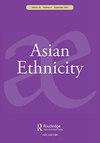Enduring fears: the monstrosity of Chinese Filipinos in Chito Roño’s Feng Shui (2004)
IF 0.8
Q3 ETHNIC STUDIES
引用次数: 1
Abstract
ABSTRACT This paper examines enduring fears and anxieties about ‘Chineseness’ that widely and persistently circulate in the Philippine cultural imaginary. Chinese Filipinos have historically been implicated in a prejudicial politics of recognition within the Philippine postcolonial state, which has attempted to forge a national identity through problematic notions of ethnic and cultural purity. To undermine what Franz Fanon calls the pitfalls of national consciousness, scholars have often turned to concepts such as syncretism and hybridity, which celebrates heterogeneity and diversity as it opposes essentialism and purity. The agenda of this paper, however, is to examine the forces that generate obstacles to an affirmative politics of cultural assimilation and belonging. Toward that goal, we offer a symptomatic reading of the film Feng Shui (2004), which we suggest condenses anxieties about Chineseness that circulate in the Philippine cultural imaginary, anxieties that amplify difference and potentially undermine the reparative force of hybridity.持续的恐惧:Chito Roño《风水》中的菲律宾人怪物(2004)
摘要:本文考察了菲律宾文化想象中长期存在的对“中国性”的恐惧和焦虑。菲律宾后殖民国家试图通过种族和文化纯洁性的问题观念来塑造民族认同,历史上,华裔菲律宾人一直卷入这一带有偏见的承认政治。为了破坏Franz Fanon所说的民族意识的陷阱,学者们经常转向融合主义和混合主义等概念,这两个概念既颂扬异质性和多样性,又反对本质主义和纯粹性。然而,本文的议程是研究阻碍文化同化和归属的平权政治的力量。为了实现这一目标,我们对电影《风水》(2004)进行了有症状的解读,我们认为这部电影浓缩了菲律宾文化想象中流传的对中国人的焦虑,这些焦虑放大了差异,并可能破坏混合性的修复力。
本文章由计算机程序翻译,如有差异,请以英文原文为准。
求助全文
约1分钟内获得全文
求助全文
来源期刊

Asian Ethnicity
PHYSIOLOGY-
CiteScore
2.80
自引率
6.20%
发文量
27
期刊介绍:
In the twenty-first century ethnic issues have assumed importance in many parts of the world. Until recently, questions of Asian ethnicity and identity have been treated in a balkanized fashion, with anthropologists, economists, historians, political scientists, sociologists and others publishing their studies in single-discipline journals. Asian Ethnicity provides a cross-disciplinary, international venue for the publication of well-researched articles about ethnic groups and ethnic relations in the half of the world where questions of ethnicity now loom largest. Asian Ethnicity covers any time period, although the greatest focus is expected to be on the twentieth and twenty-first centuries.
 求助内容:
求助内容: 应助结果提醒方式:
应助结果提醒方式:


